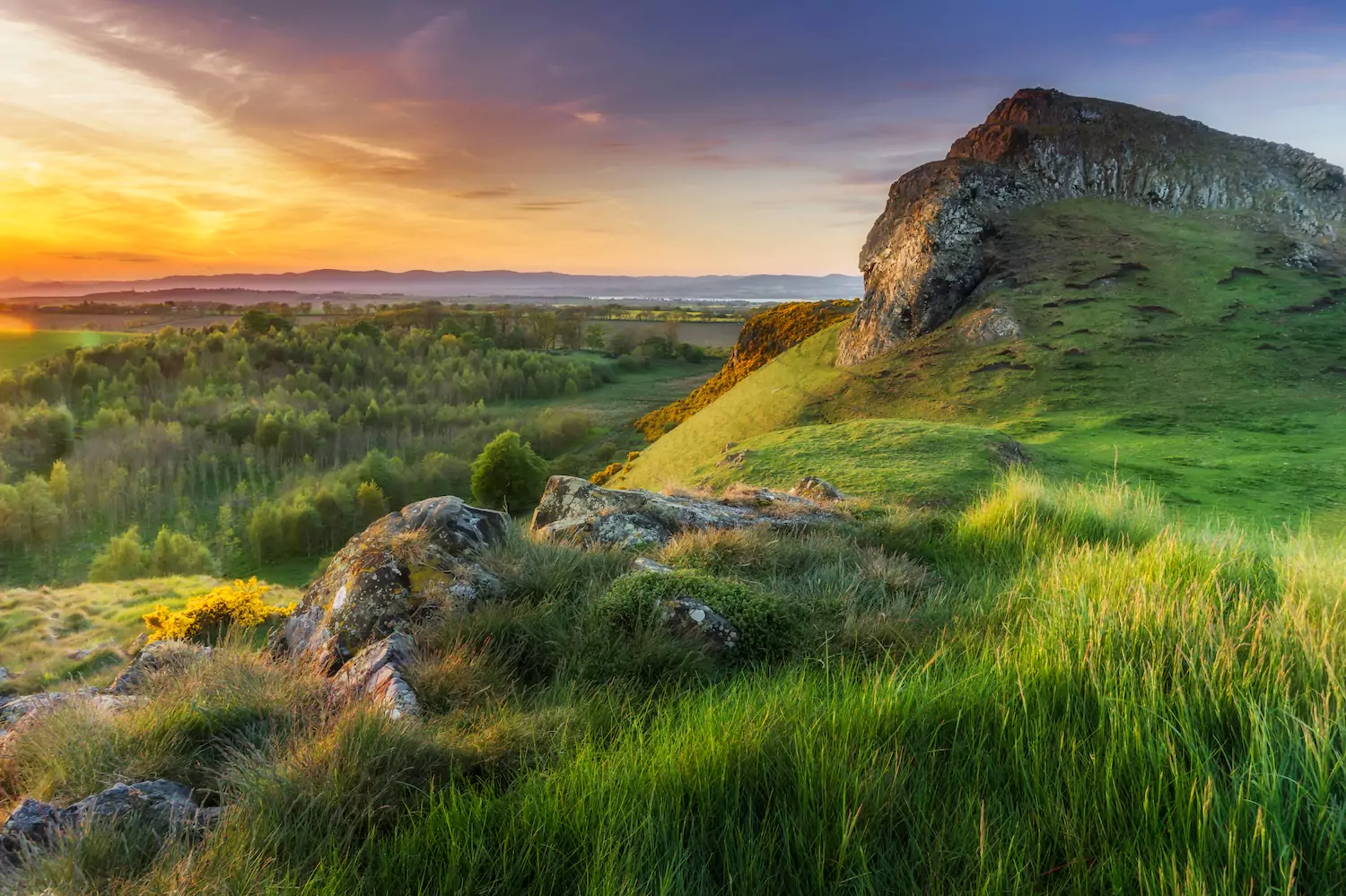Connecting Scripture to Place
In late June of 2023, I met my dear friend and mentor, Betty-Anne, in Northern England for two weeks of rest. We spent most of the trip hiking large sections of Hadrian’s Wall, a landmark constructed 2,000 years ago to defend the northwestern boundary of the Roman Empire.
A lot of preparation went into the trip. We read guidebooks, purchased raincoats (for ourselves and our backpacks!), and trained to build physical endurance. That spring, my husband volunteered to be my personal trainer, which meant he gleefully loaded my backpack with progressively heavier weights and accompanied me on long walks.
A few months before our trip, my pastor preached through Psalm 90. His sermon piqued my interest in memorizing a passage that simultaneously warns and encourages us to live with humble awareness of God’s attentive presence. I shared it with Betty-Anne, and she agreed we should memorize this Psalm as we walked. Attending each of these details contributed to the success of our 100+ mile trek but selecting Scripture to memorize while we walked contributed most significantly to the restfulness of the trip.
Betty-Anne and my decision to think deeply about a passage of Scripture within the boundaries of a specific moment in time and place forged precious memories intertwined with truth from God’s Word. We both have personal takeaways from the ways Jesus met with us on that trip, but God’s enduring Word is the basis of those takeaways. As you plan for your next vacation or pastoral sabbatical, here are a few tips for entering into this practice.
Choose a Passage
Then, break it down into manageable sections and commit to meditating on one section per day. I wanted to look at each day’s verse while we hiked, so I wrote the passage on a piece of paper and carried it in my pocket. Taking a hard copy of the passage allowed me to keep my phone in my pocket more often, another important component of rest! Memorizing the same translation as your companion will also make it easier to quiz each other. I have come to think of what we did on that hike as connecting Scripture to place. Connecting Scripture to place works by combining two familiar spiritual disciplines, bible memorization, and meditation, then deliberately placing them in the setting of a specific life event.
How Does the Passage Apply to Your Individual Context?
As we walked and meditated on the rich theological content of this passage, we encountered the landmarks and landscape of Northumberland. God’s Word is the same throughout every generation, but the applications we garner from the Bible are unique given our individual contexts. Each day of Scripture memorization had its own encouragements. In Psalm 90, Moses remembers that God was there when the mountains were born; His continuity is unwavering. He can’t be contained by the unyielding timeline that hastens mankind toward death. Moses also considered the sobering contrast between the Eternal One and man. People are fragile and fallible. We not only spring up and begin to wither immediately, but we also deserve God’s judgment. Yet Moses is a man who is emboldened by God’s grace. He ends the prayer by approaching God confidently – asking God to allow work done by his mortal hands to endure.
“May the favor of the Lord our God rest upon us; establish the work of our hands for us – yes, establish the work of our hands.”
Have you had the confidence to pray a prayer that bold for your own ministry? Pondering this question in a new place led me to a fresh perspective on God’s unchanging Word. I’ll end by sharing it with you. I hope it encourages you to pray boldly as you do the hard work of pastoring the people God has given you to care for.
The Work of Your Hands
Moses tells us that one of the ways God shows favor to men and women is by establishing the work of their hands. I meditated on this verse as we hiked up and through the highest elevations of our journey. Beside me on this rugged terrain was a waist-high wall of neatly stacked, expertly hewn stones. The Crags are steep cliffs frequently battered by gusty wind and beating rains. I stopped at one of the highest vantage points to catch my breath. I looked behind me and saw the most glorious view of Hadrian’s Wall. Dark storm clouds stacked on the horizon. Below them, the wall snaked unbroken, dipping into a valley and reemerging on the next slope before eventually dropping out of sight.
How many people can say that their work has lasted two thousand years? Before this trip, I assumed God chose to establish only the ambitious endeavors of powerful people like Hadrian. After all, this great monument bears his name. While visiting the wall and examining its careful construction, I began to rethink my position. Does anything remain that was constructed by Hadrian’s hands? Archaeologists continue to unearth currency bearing the emperor’s distinct profile, but who made those coins? Who melted metal and cast it? Who cut and stacked the stones that have withstood strong winds for so many days? Hadrian’s hands didn’t form any of these things. The empire Hadrian worked to protect has long since fallen. Yet it pleased God to establish the work of many ordinary people who labored under the emperor’s command. Isn’t this often the case? God is impartial in His dealings with us. We see this in the way he establishes the works of diverse sectors of humanity. We have sculptures and paintings signed by famous masters, but the world’s pyramids and cathedrals were all built by unnamed slaves and common laborers. Preserving these structures pays respect to monumental human achievement, but we also collect and display arrowheads sculpted by men and women trying to feed and clothe their families. Their goals were industrious and ordinary, yet some relics are kept carefully for subsequent generations to enjoy.
God Establishes the Works of Ordinary People Who Labor in Excellence
I prayed with newfound boldness as I meditated on Psalm 90:17 in the Crags. Before that day I assumed nothing from my hands could ever be significant enough to establish. I thought this portion of Moses’s prayer was for other Moseses – leaders God uses to accomplish His large-scale purposes. As I applied biblical truth in the English countryside, I learned that God also chooses to establish the works of some ordinary people who labor with excellence.
Pastor, as you seek to lead God’s people, you can pray this prayer too. This isn’t only a passage for those who shepherd mega-churches. It’s a prayer for every person who hopes to leave behind a legacy of faithful service to the Lord. It is both lofty in its ambition and humble in its assessment of self. Only God can make this happen. There is no immediate gratification with a prayer like this. We must pray this prayer patiently because we will not receive God’s answer on this side of eternity.
The next time you have an opportunity to rest, I hope you pack a passage of Scripture to hide in your heart and weave into your memories. Wherever your travels take you, meditate on God’s Word, observe the world around you, and draw out new biblical applications. Then watch and see how God uses this practice to give you lasting insights and soul-nourishing encouragement to draw on throughout the year.
©2024 Jenny Solomon. Used with permission.
About The Author

Jenny Solomon
Jenny Solomon studied Philosophy and Religion at College of the Ozarks, attended The Southern Baptist Theological Seminary, and has served as a ministry wife for over a decade. She and her husband, Curtis, are founders of Solomon SoulCare.








